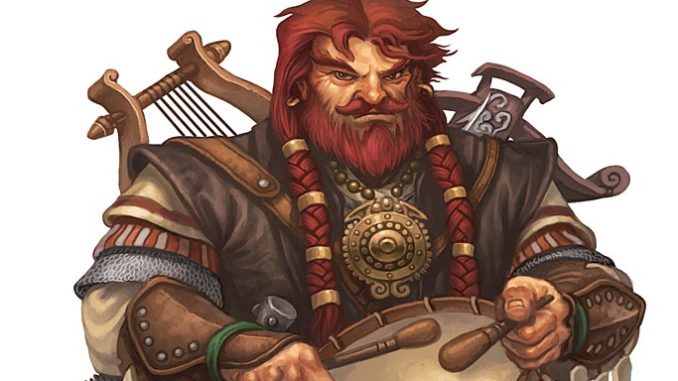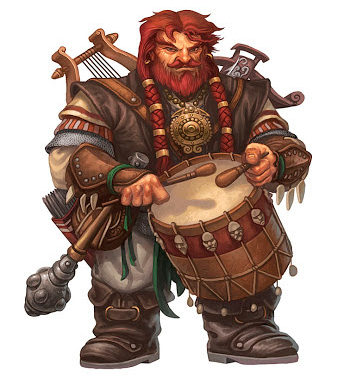
Backgrounds as presented in Dungeons and Dragons 5th Edition are a fairly important part of the character creation process. They tell you where your character came from as well as giving you additional mechanical benefits in the form of proficiencies and abilities that have the opportunity to become powerful storytelling tools. But so often I see people recommending the combinations that make the most sense – the Cleric who grew up as an acolyte or the Fighter that was a soldier before he took up the mercenary lifestyle. There are so many rich stories that can be told if you think a little outside the box in terms of your character’s background. This week I wanted to build off of last weeks introduction of the Surface Dwarf and show you just one way that a character could be built using this new character option.
Darion
Surface Dwarf Bard 1

Armor Class 13
Hit Points 9 (1d8+1)
Proficiency Bonus +2
Speed 25 ft
Alignment neutral good
Languages Common, Dwarven
Ability Scores
Strength 8 (-1)
Dexterity 14 (+2)
Constitution 12 (+1)
Intelligence 10 (+0)
Wisdom 13 (+1)
Charisma 17 (+3)
Attacks
Melee Attack: Rapier +4 1d8+2 piercing damage, finesse
Melee Attack: Club +1 1d4+1 bludgeoning damage, light
Melee or Ranged Attack: Dagger +4 1d4+2 piercing
Skills Acrobatics +4, Animal Handling +1, Arcana +0, Athletics +1, Deception +3, History +0, Insight +1, Intimidation +3, Investigation +0, Medicine +1, Nature +0, Perception +3, Performance +5, Persuasion +45 Religion +0, Sleight of Hand +2, Stealth +2, Survival +1
Equipment rapier, entertainer’s pack, drum, leather armor, dagger, belaying pin (club), lucky charm, set of common clothes, and a belt pouch containing 10 gp.
Class Features
Proficiencies
Armor Proficiencies: Light armor
Weapon Proficiencies: Simple weapons, hand crossbows, longswords, rapiers, shortswords, battle axes, and warhammers
Tool Proficiencies: Brewer’s supplies, carpenters tools, drum, horn, lute, navigator’s tools, vehicles (water)
Saving Throws: Dexterity and Charisma
Skill Proficiencies: Acrobatics, Athletics, Perception, Performance, Persuasion
Bardic Inspiration (d6): As a bonus action, you can choose one creature other than yourself within 60 feet of you that can hear you, granting them one Bardic Inspiration die. Once within the next 10 minutes, the creature can roll the die and add the number rolled to one ability check, attack roll, or saving throw it makes. The creature can wait until after it rolls the d20 before deciding to use the Bardic Inspiration die, but must decide before the DM says whether the roll succeeds or fails. Once the Bardic Inspiration die is rolled, it is lost. A creature can have only one Bardic Inspiration die at a time. You can use this ability 3 times before needing to rest. You regain any expended uses when you finish a long rest.
Spellcasting: Your spellcasting ability is Charisma (spell save DC 13, +5 to hit with spell attacks). You know the following spells
Cantrips (at will): mending, vicious mockery
1st-level spells (2 slots): charm person, dissonant whispers, feather fall, sleep
Racial Features
Affable: Whenever you make a Charisma (Persuasion) check during honest interactions (such as business deals, negotiations, or diplomacy), you can add twice your proficiency bonus, instead of your normal proficiency bonus.
Darkvision: You can see in dim light within 60 feet of you as if it were bright light, and in darkness as if it were dim light. You can’t discern color in darkness, only shades of gray.
Dwarven Resilience: You have advangagte on saving throws against poison, and you have resistance against poison damage.
Industrious: When crafting non-magical items (and only non-magical items), during downtime, you can craft up to 10 gp worth of items or objects each day instead of the usual 5 gp.
Stonecutting: Whenever you make an Intelligence (History) check related to the origin of stonework, you are considered proficient in the History skill and add double your proficiency bonus to the check, instead of your normal proficiency bonus.
Background: Sailor
Ship’s Passage: When you need to, you can secure free passage on a sailing ship for yourself and your adventuring companions. You might sail on a ship you served on, or another ship you have good relations with (perhaps one captained by a former crewmate). Because you’re calling in a favor, you can’t be certain of a schedule or route that will meet your every need. Your Dungeon Master will determine how long it takes to get where you need to go. In return for your free passage, you and your companions are expected to assist the crew during the voyage.
Personality Traits: I like a job well done, especially if I can convince someone else to do it.
Ideals: People. I’m committed to my crewmates, not to ideals.
Bonds: I’ll always remember my first ship.
Flaws: I’ll say anything to avoid having to do extra work.
History: Darion was very young, barely able to walk on his own when his clan was sent aboveground. By the time he could speak, his people had formed expansive trade deals with neighboring settlements, and visitors of all shape and size were commons sights in the dwarven settlement. Perhaps that is why he never took to work like so many of those that came from underground. Or maybe it was just him. Regardless, the young dwarf hated working. Instead, he had a knack for talking people into doing his work for him, so that he could slack off and fool around. He did, however, have a passion for music. He bought himself a drum early on and taught himself whatever songs and chants he could, oftentimes sneaking aboard merchant wagons headed to the nearby port city to listen to the sailors singing their work songs. One day, a ship’s captain overheard the young man singing along and offered to bring him aboard as a shanty man. Darion jumped at the chance, not realizing how much work he was actually in for. There were precious few places he could hide on the ship and the crew weren’t too keen on letting the dwarf shirk his duties. Still, Darion found the voyage to be an exhilarating experience, and when the ship landed back in harbor, he signed on for another three months, and then another three months. Before he knew it, he had spent several years at sea with various ships and ship captains. As the years went by he grew to become a capable sailor. He also continued to pursue his love of music, learning about the magic that was locked inside of it during some R&R in a foreign port of call. Most importantly, he learned how to use those skills to cut corners aboard the ship, subtly influencing people to do his work for him or mending tears in the sails with his magic so that he could knock off early. However, after a particularly nasty storm nearly sank the ship he was aboard, he decided that it was time to get back to dry land for a while. After the ship limped its way back to port, he took his leave of the sailor’s life to see what he could find back home.
Roleplay Tips: You’re one smooth son of a bitch and you aren’t afraid to show it. You possess the same gumption and drive as the rest of your race – you can do the work, you just choose not to. Someone else who wants the roof mended properly is better off doing it than you. There’s not a cloud in the sky after all! Why worry about the rain when you could be laying in the meadows feeling the warm sun on your face as you drift in and out of afternoon naps. That’s the way life is meant to be lived. When things get real, you tend to jump ship, such as leaving the sea for dry land after the massive storm that nearly sank your ship. What will happen if you’re put into another life and death situation?
Advancement: There are any number of ways that this character could be taken. If you choose to stay in the Bard class, you might look into either the College of Glamour or the College of Satire (both Unearthed Aracana options). The College of Valor from the Core Rulebook could be a good choice as well if he finds himself forced to grow up quickly as he begins adventuring (perhaps through the death of a friend or a mentor). Alternatively, his lack of drive may cause him to float between several different classes, abandoning the Bard when it becomes more work than he bargained for and exploring something else new and exciting.
